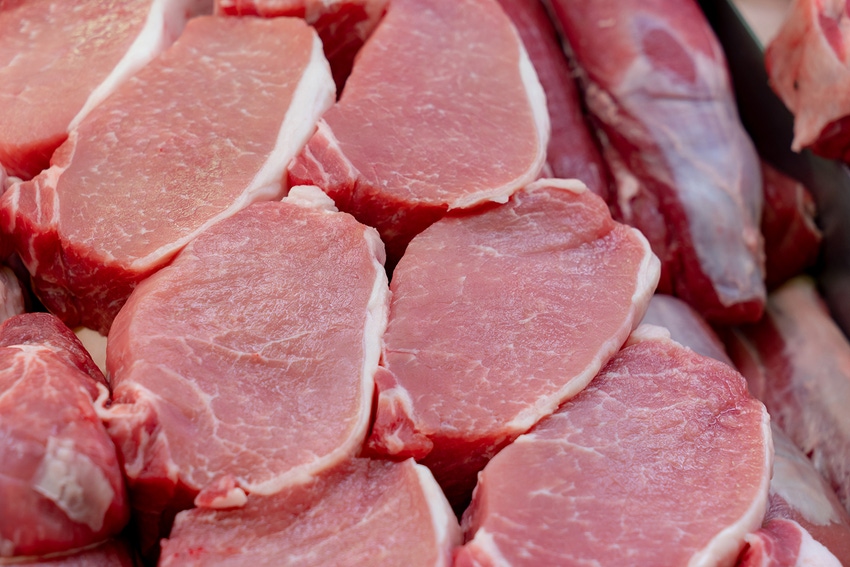Legislators seek to end New Swine Slaughter Inspection System
Legislative Watch: Safe Line Speeds in COVID-19 Act; Boycott Big Meat; Dietary Guidelines Advisory Committee recommendations; 2021 appropriations bills.

The "Safe Line Speeds in COVID-19 Act" introduced by Reps. Marcia Fudge (D-OH), Rosa DeLauro (D-CT) and Bennie Thompson (D-MS) would stop the USDA from allowing increases in line speeds for meat and poultry packing plants and would end the New Swine Slaughter Inspection System.
Fudge says, "The meat and poultry processing industry has been devastated by the COVID-19 pandemic, with infection hotspots appearing in plants across the country. Fast line speeds make the dangerous condition workers at these plants already face even worse by packing them closer together and placing them at greater risk of contracting or spreading the virus. Waiving limits on processing speeds also threatens the safety of our food supply. As COVID-19 cases continue to soar at processing plants, we must prioritize worker, food and animal safety over increased production and profits."
The legislation would:
Suspend all active waivers issued by USDA related to line speeds at meat and poultry establishments and suspend USDA's authority to issue new waivers in this area
Suspend implementation of, and conversion to the New Swine Slaughter Inspection System established under USDA's final rule published on Oct.1, 2019, titled, "Modernization of Swine Slaughter Inspection"
Prohibit USDA from using federal funds to develop, propose, finalize, issue, amend or implement any policy, regulation, directive, constituent update or any other agency program that would increase line speeds at meat and poultry establishments
Those endorsing the legislation include the American Society for the Prevention of Cruelty to Animals, American Federation of Government Employees, Center for Science in the Public Interest, Consumer Federation of America, Food and Water Watch, Humane Society of the United States and United Food and Commercial Workers International Union.
The New Swine Slaughter Inspection System went into effect last December.
Boycott Big Meat
A coalition has launched an educational and lobbying campaign urging consumers to "Boycott Big Meat." The coalition is suggesting that consumers should purchase food items from smaller, independent operations which are not as harmful to the environment and safer instead of buying products from big meat companies.
The Socially Responsible Agricultural Project's executive director Sherri Dugger says, "With price fixing, injustices to farmers and meatpacking plant workers, a lack of food security and infrastructure, and environmental and public health concerns that hurt us all, the industrial livestock system has long been rife with abuse. Our future depends on our taking action."
The coalition includes the Organic Consumers Association, Forward Latino, Socially Responsible Agricultural Project, Joseph Mercola, and U.S. Farmers and Ranchers for a Green New Deal.
Dietary Guidelines Committee: Less alcohol, sugar
The Dietary Guidelines Advisory Committee last week in its 800-page assessment on nutrition science recommends men reduce their alcohol consumption and all Americans should eat less added sugar.
The new recommendations include:
Men should reduce their intake to one alcoholic drink per day. Current advice is two drinks per day.
Americans should not get more than 6% of their calories from added sugars. Current recommendation is less than 10%.
The committee continues to recommend increasing the consumption of fruits and vegetables; legumes; whole grains; low or non-fat dairy; lean meats and poultry; seafood; nuts; and unsaturated vegetable oils. Also, individuals should cut back on red and processed meats, sugar-sweetened foods and drinks, and refined grains.
The assessment will be used by USDA and the Department of Health and Human Services to update the 2020 Dietary Guidelines for Americans. The DGA offers the official nutrition advice on what to eat and drink to promote health and prevent chronic disease. The guidelines are updated every five years.
USDA and HHS are accepting written public comments on the committee's report through Aug. 13.
House to consider FY '21 Agriculture Appropriations
The House of Representatives will begin to consider fiscal year 2021 appropriations bills next Thursday and Friday. First up will be a package that includes agriculture; state and foreign operations; military construction and veteran affairs; and interior and environment.
Source: P. Scott Shearer, who is solely responsible for the information provided, and wholly owns the information. Informa Business Media and all its subsidiaries are not responsible for any of the content contained in this information asset.
About the Author(s)
You May Also Like



